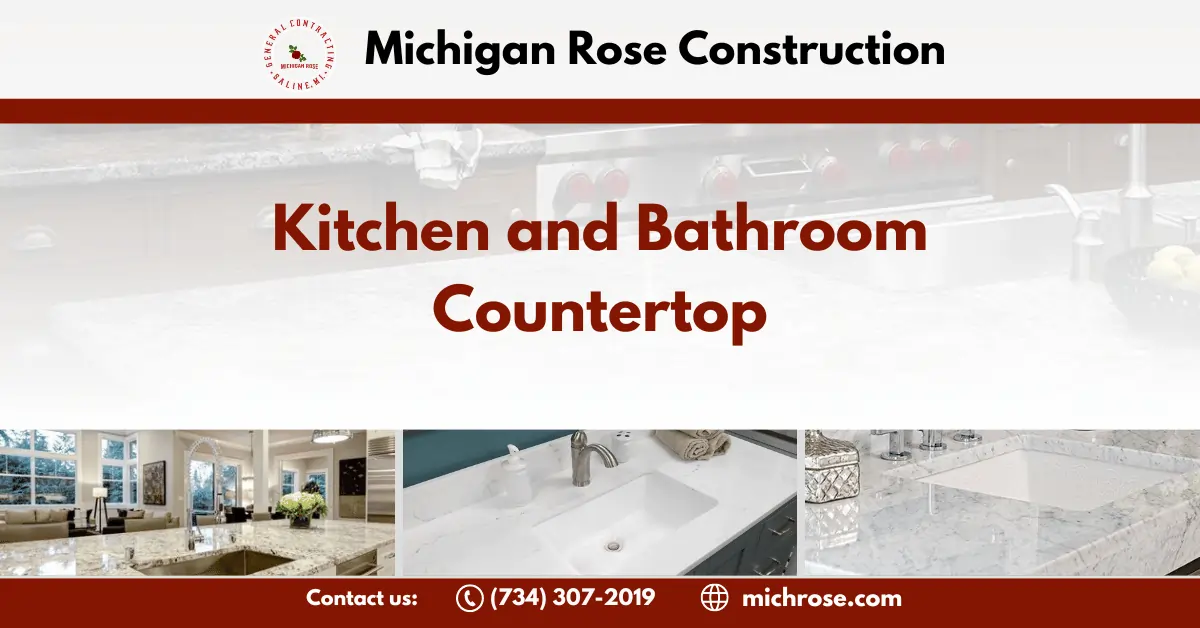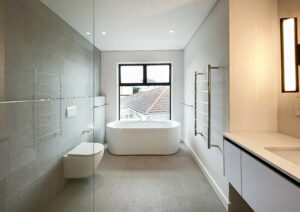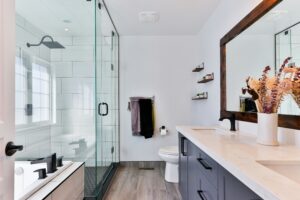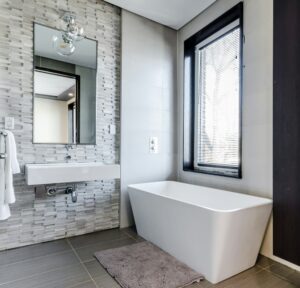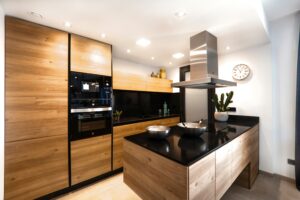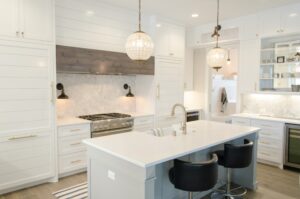Kitchen and Bathroom Countertops: Introduction
Welcome to our guide on kitchen and bathroom countertops near Ann Arbor, MI! If you’re in the process of designing or remodeling your kitchen or bathroom, choosing the right countertop material is one of the most important decisions you’ll make. The countertops are a major focal point and get used every single day, so you want to select a material that is practical, beautiful, and fits within your budget.
In this post, We’ll draw upon our expertise to provide helpful insights on the most popular kitchen and bathroom countertops options, their pros and cons, and factors to consider when selecting your new countertops. Whether you prefer natural stone, engineered materials, tile, wood, or even laminate, We’ll make sure you have all the information you need to make the perfect choice for your home. Let’s dive in!
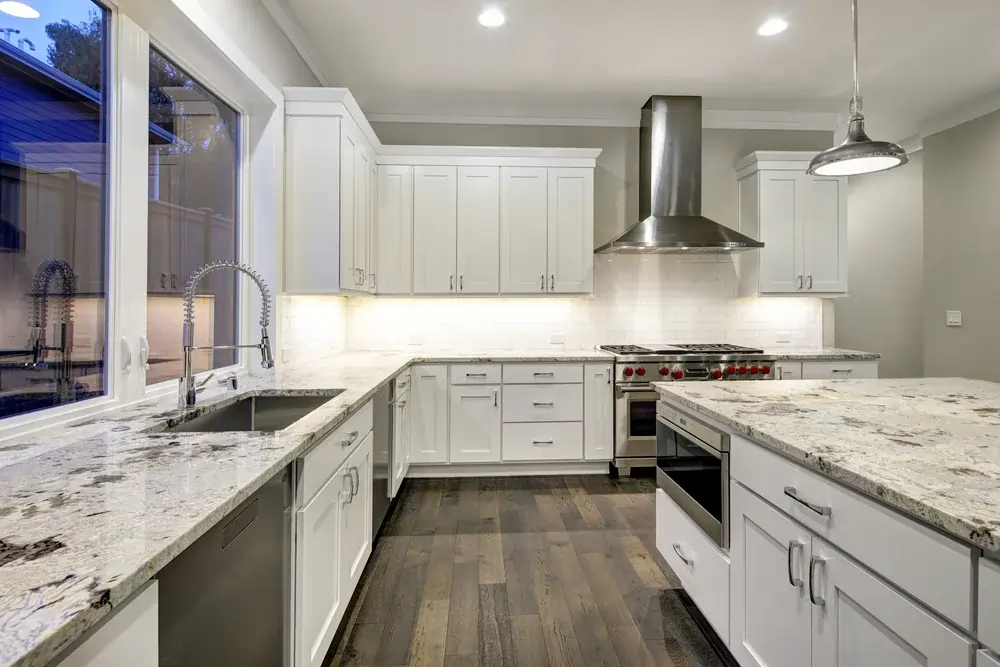
Countertop Materials
When selecting a countertop for your kitchen and bathroom countertops, there are many materials to consider that each have their own pros and cons. Through my 10 years of experience as a contractor, here are the most popular countertop options:
- Granite – Granite is a natural stone that is one of the most popular choices for countertops. It is extremely durable, scratch-resistant, stain-resistant, and heat-resistant. Granite requires annual sealing and comes in a wide variety of colors and patterns. It can be prone to chipping or cracking if subjected to heavy impact.
- Marble – Marble is another natural stone option that is elegant with beautiful veining patterns. However, it is more porous than granite so sealing is very important. Marble stains more easily and can etch from exposure to acids. It has a higher maintenance requirement than other stones.
- Quartz – Engineered quartz countertops are man-made from crushed quartz and resin. Quartz is non-porous, very durable, and low maintenance. It resists scratches, stains, heat, and moisture. There are many color and pattern options to choose from.
- Laminate – Laminate countertops are budget-friendly options made from laminated plastic adhered to a plywood or particle board. They are easy to install, durable, and come in many colors and patterns. However, laminate can peel, scratch, stain, or scorch more easily than natural materials.
- Wood – Wood countertops like butcher block add natural beauty and warmth to a kitchen. They can be stained, sanded and resealed for upkeep. Wood is prone to scratches, staining, and moisture damage without proper maintenance.
- Tile – Ceramic, porcelain or stone tile can be used to create a custom look for countertops. Grout requires sealing and tile can chip. The uneven surface requires more cleaning. Tile works best for backsplash rather than full countertops.
Granite Countertops
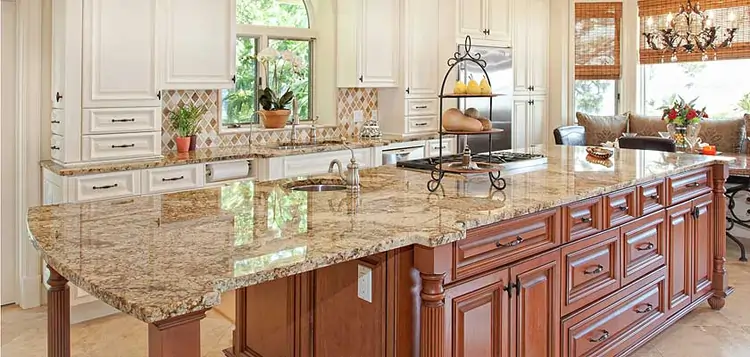
Granite is one of the most popular choices for kitchen and bathroom countertops due to its natural beauty and durability. Here are some of the key factors to consider with granite countertops:
Pros
- Granite is very strong and durable, able to withstand heat, scratches, and stains. It does not burn or scorch.
- The natural patterns and colors of granite make each slab unique. Granite can be polished to a shiny or matte finish.
- Granite is a timeless material that has remained popular for countertops for years. It adds value to a home.
- Granite requires very little maintenance. It just needs to be sealed occasionally to prevent staining.
Cons
- Granite is one of the more expensive natural stone options for countertops. Expect to pay $50-$150 per square foot installed.
- Granite is porous and can stain if not properly sealed. Acidic substances like wine, tomato sauce, and citrus can etch granite.
- Granite is very heavy, requiring extra structural support. Most homes require reinforcement to support a granite countertop.
- Granite requires professional installation. The slabs are fragile and difficult to cut and install as a DIY project.
Maintenance
- Granite should be sealed upon installation and then every 1-2 years after that.
- Clean granite regularly using mild dish soap and water. Avoid abrasive cleaners.
- Blot spills immediately to prevent staining. Reseal if liquids are noticed soaking into the granite.
- Avoid placing hot pans directly on granite. Use trivets and hot pads.
Granite’s natural beauty and durability make it a luxurious and lasting choice. With proper sealing and care, granite countertops can remain in great shape for decades. The high upfront cost is offset by the value and elegance granite adds to a kitchen or bathroom.
Marble Countertops
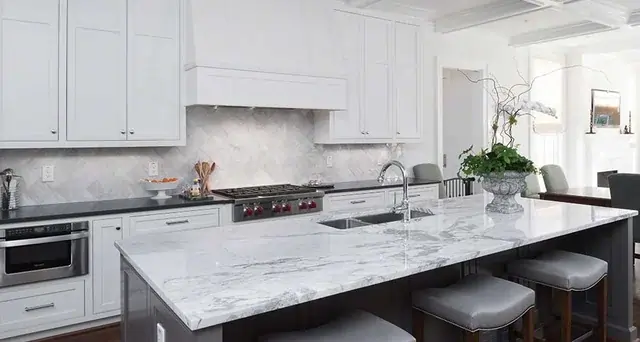
Marble is a classic and elegant choice for kitchen and bathroom countertops. As someone who has installed countertops professionally, we have extensive first-hand experience working with marble in homes.
Pros of Marble Countertops:
- Beautiful and unique natural stone patterns and veining – no two slabs are alike
- Creates an upscale, luxurious look
- Cool to the touch, which is nice for baking tasks
- Available in a range of colors like white, gray, black, green, etc.
Cons of Marble Countertops:
- Expensive – natural marble is one of the pricier countertop options, costing $80-150 per square foot installed.
- Stains easily – marble is porous and can absorb liquids, leading to stains from things like wine, coffee, and acidic foods. Proper sealing is essential.
- Susceptible to etching and scratching – while marble is quite durable, it can be etched by acid or scratched from knives and abrasives.
Maintenance for Marble Countertops:
- Regular sealing every 1-2 years with a penetrating sealer protects from stains.
- Daily cleaning with a pH-neutral stone cleaner. Avoid vinegar, citrus, and harsh chemicals.
- Immediately wipe up spills to prevent stains – don’t let liquids sit.
- Use trivets and cutting boards to prevent scratches.
- Re-polish annually using a marble polishing compound to keep surfaces smooth.
With proper care and maintenance, marble countertops can stay beautiful for decades and are a worthwhile investment for many homeowners seeking timeless, classic elegance. The smooth, cool surface adds luxury and sophistication to any kitchen or bath.
Quartz Countertops
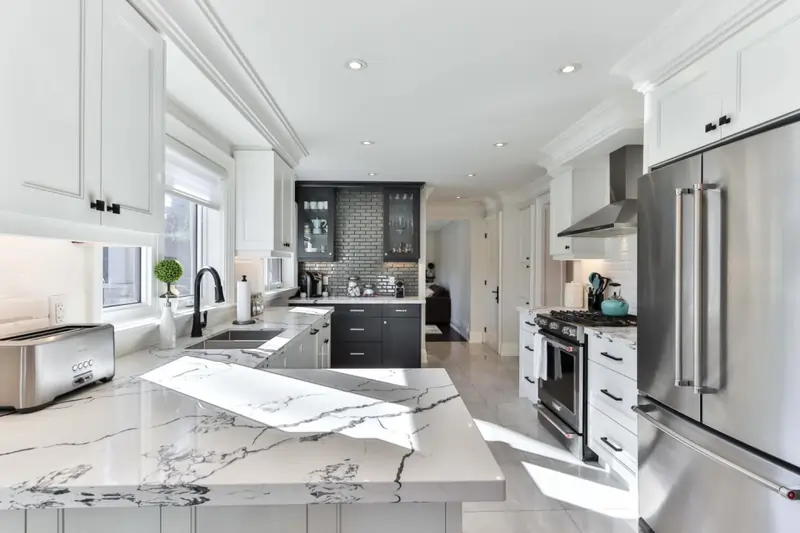
Quartz countertops are engineered stone made from crushed quartz blended with resins and pigments. They have become an increasingly popular option for kitchen and bathroom countertops in recent years. Here are some key things to know about quartz:
Pros
- Extremely durable and scratch resistant. Quartz is nearly indestructible under normal use.
- Requires very little maintenance. Unlike natural stone, quartz does not need to be sealed and is easy to keep clean.
- Resists stains, heat, and moisture well.
- Available in a wide range of colors and patterns. Manufacturers can create consistent, uniform slabs.
- Non-porous so does not harbor bacteria.
- Typically has at least a 10-year warranty. Some have 15-year or lifetime warranties.
Cons
- Not as heat resistant as granite. Hot pans can potentially damage the surface. Trivets should be used.
- Repairs and seam lines are more noticeable than with natural stone.
- Pricing is higher than laminate but generally slightly less than natural stone. Cost is $50-150 per square foot installed.
Maintenance
- Clean with mild soap and water. Avoid abrasive cleaners.
- Disinfect periodically with hydrogen peroxide or rubbing alcohol.
- Resealing is not necessary.
Quartz offers the look of natural stone with excellent durability and less maintenance. The range of styles and colors makes it adaptable for nearly any kitchen or bath. With routine care, quartz countertops will retain their beauty for many years.
Laminate Countertops
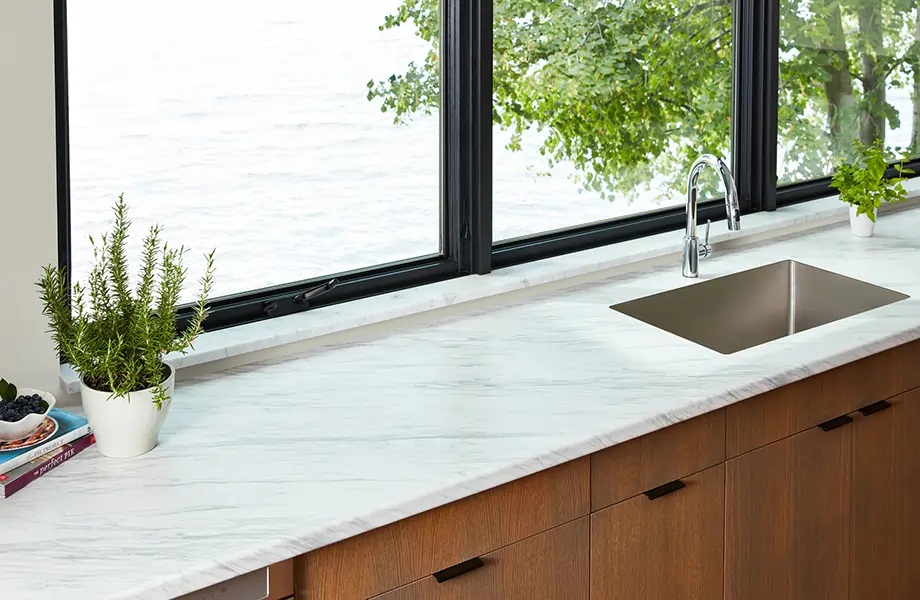
Often overlooked, laminate countertops remain a popular and affordable choice for many homeowners and renters. Laminate countertops, also known as “plastic laminate,” are made by fusing plastic resin with layers of kraft paper. This process creates a durable, seamless surface that resists stains, scratches, burns, and moisture damage.
Pros
- Budget-friendly option, typically costing $20-50 per linear foot installed
- Wide variety of colors and patterns to choose from
- Easy to install and replace when remodeling
- Minimal maintenance required – just wipe clean with soap and water
- Resists chipping, scratching, and burning
Cons
- Not as durable as natural stone or quartz
- Can be prone to bubbling or peeling around sinks cutouts
- Seams may be visible, especially lighter colors
- Not heat or stain resistant compared to other materials
- Prone to showing wear and scratches over time
Laminate countertops can be an excellent choice for rental properties, starter homes, or quick kitchen makeovers on a tight budget. With proper care and maintenance, laminate countertops can last 10-20 years. Just avoid abrasive cleaners, hot pots/pans directly on the surface, and sharp objects that could scratch or gouge the laminate finish. Overall, laminate delivers an affordable, low-maintenance countertop option.
Wood Countertops
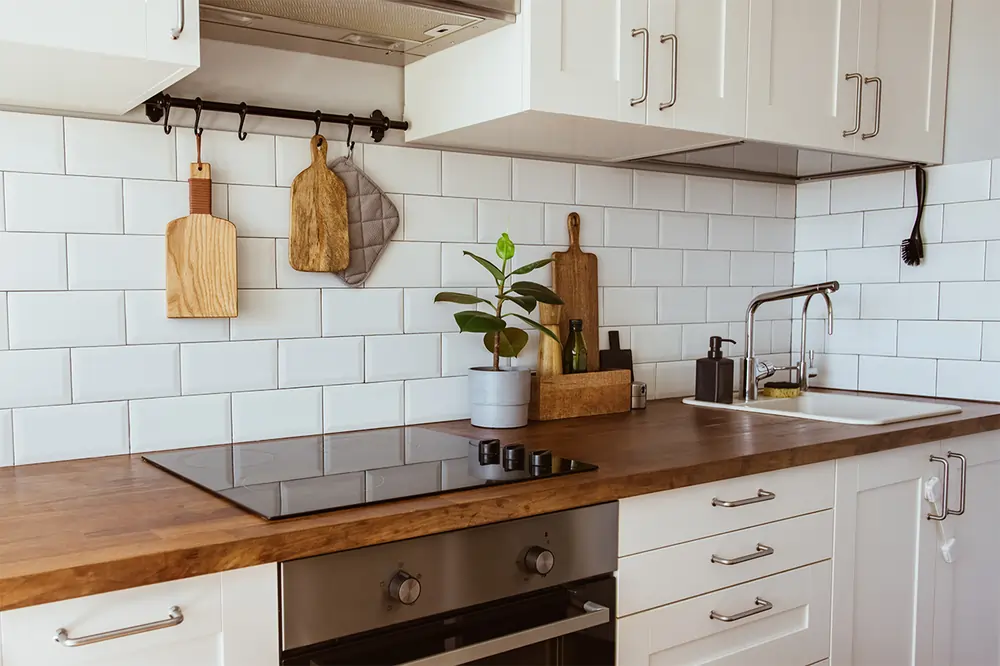
Wood countertops can add natural warmth and beauty to any kitchen or bathroom. Made from various types of wood like oak, maple, walnut, and bamboo, they have some unique advantages and disadvantages compared to other countertop materials.
Pros of Wood Countertops:
- Warm, natural aesthetic that brings life to a space
- Available in wide range of stains and finishes to match any style
- Can be sanded and refinished over time, increasing longevity
- Less expensive than stone options like granite and marble
- Eco-friendly and sustainable material
Cons of Wood Countertops:
- Prone to scratches, burns, and other damage from normal wear and tear
- Can warp or crack if exposed to excessive moisture
- Requires sealing to resist stains
- Not as heat or water-resistant as stone or quartz
Cost of Wood Countertops:
The average price of wood countertops ranges from $40-$100 per square foot installed. The specific wood type used and finishing details will impact the overall cost. More exotic and durable hardwoods like teak, walnut, or mahogany will be more expensive.
Maintaining Wood Countertops:
- Seal regularly with food-safe sealant to prevent stains and water damage
- Use cutting boards and hot pads to prevent scratches and burns
- Clean with mild soap and water, avoid abrasive cleaners
- Sand and refinish periodically to restore luster
With proper care and maintenance, wood can be a warm yet functional countertop material that adds natural flair to any space. Considering the pros, cons, and costs allows homeowners to make the best selection for their needs and budget.
Tile Countertops
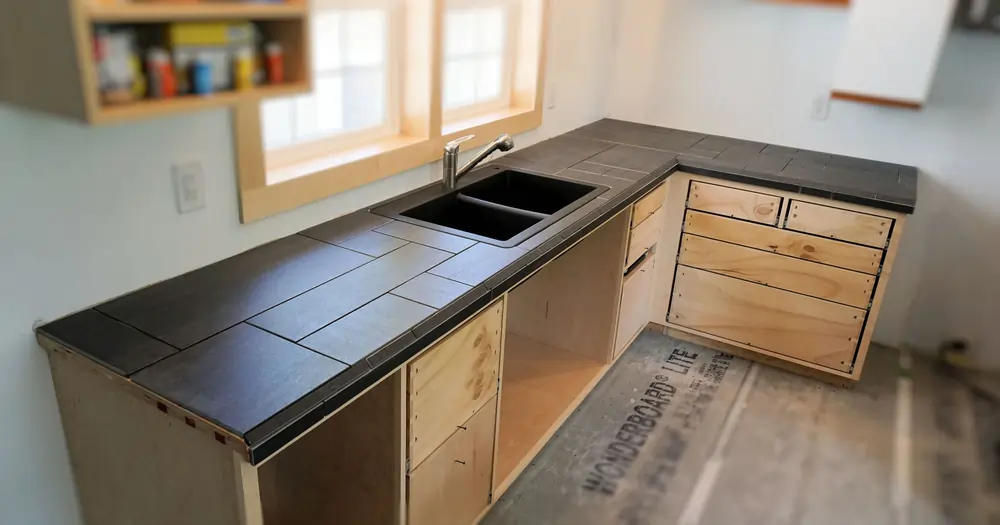
Tile can be an attractive and affordable option for kitchen and bathroom countertops. Here are some of the main pros and cons of tile countertops:
Pros:
- Tile comes in a wide variety of styles, colors, shapes, and textures to fit any design aesthetic. From natural stone and ceramic to glass and porcelain, the options are nearly endless.
- Tile is very durable and resistant to scratches, heat, and stains. It can last for decades with proper care.
- Tile is water-resistant, making it a good choice for kitchens and bathrooms. It won’t warp or deteriorate when exposed to moisture.
- Tile is easy to clean. Food and dirt wipe away easily.
- Tile can be cooled to room temperature quickly, so it won’t retain heat.
- Installing tile can be a DIY project, reducing installation costs.
Cons:
- Grout lines between tiles can trap dirt and bacteria if not cleaned properly. Re-grouting may be needed periodically.
- Dropped heavy objects may crack tiles. Risk of cracking increases for thinner tiles.
- Tile has a hard surface and items dropped on it are more likely to break.
- Tile can feel cold underfoot due to heat transfer. Radiant floor heating is an option to remedy this.
- Professional installation is recommended for best results. DIY projects may have imperfections.
Pricing: Tile pricing varies dramatically. Ceramic tile starts around $2 per square foot. Porcelain, stone, glass and other tiles can range from $5-$50 per square foot or more. Material cost is just one part of the total project cost. Professional installation, mortar, grout, sealant and labor will also factor in.
Maintenance: Tile requires regular cleaning with a non-abrasive cleaner. Re-sealing grout lines annually will protect against stains and mildew. Cracked or damaged tiles can be replaced individually.
Selecting a Countertop
When selecting a bathroom and kitchen countertops, there are several important factors to consider:
- Budget – Countertop materials can range greatly in price. Granite and marble are generally the most expensive options, while laminate is the most budget-friendly. Be sure to understand material costs before deciding.
- Use – Consider how the space will be used. For example, if you do lots of baking and cooking, you may opt for a more durable surface like quartz that can withstand heat.
- Style – The countertop should complement your overall kitchen or bath design and aesthetic. For contemporary spaces, quartz or concrete finishes tend to work well, while traditional styles may call for granite or marble.
- Maintenance – Some materials like granite are porous and require yearly sealing to prevent stains. Others like laminate are lower maintenance. Factor in ongoing care when selecting.
- Durability – Materials like quartz and granite are very strong and durable, while marble and wood can be more prone to scratches, cracks and water damage. Consider durability based on your lifestyle.
- Stain resistance – If you tend to stain surfaces often, avoid porous materials like marble and concrete. Quartz and laminate are generally the most stain-resistant options.
- Sustainability – If eco-friendliness is important to you, some materials like concrete and wood from renewable sources are more sustainable choices than granite or marble.
- Appearance – Sample different materials to see what best complements your space. Visiting showrooms can help narrow options.
As an expert tip, be sure to explore all the design possibilities before deciding on a material. Get creative with patterns, edges, inserts, and accents to make your kitchen and bathroom countertops truly unique. An experienced countertop professional can help advise on the best options for your needs, budget and style.
See Home Remodeling in Ann Arbor MI
Conclusion
Deciding on new kitchen and bathroom countertops can be an exciting experience, but also requires careful consideration of the pros and cons of different materials. In this article, we’ve covered the most popular kitchen and bathroom countertops options like granite, marble, quartz, laminate, wood, and tile.
When selecting your new kitchen and bathroom countertops, be sure to think about your lifestyle, budget, and design aesthetics. Granite and marble are classic natural stone choices that add elegance, while more affordable laminate and tile can mimic the look of other materials. Maintenance is also a key factor – quartz and laminate are low maintenance, while marble requires more sealing and care.
At the end of the day, you want your kitchen and bathroom countertops that will stand the test of time and suit your needs. Focus on finding a material that fits within your budget but doesn’t compromise too much on appearance and durability. With some smart planning and research, you’ll end up with beautiful new countertops that you’ll enjoy for years to come.
Planning to build a kitchen and bathroom countertop?
Visit Michigan Rose Construction Facebook Page or you can call (734) 307-2019

